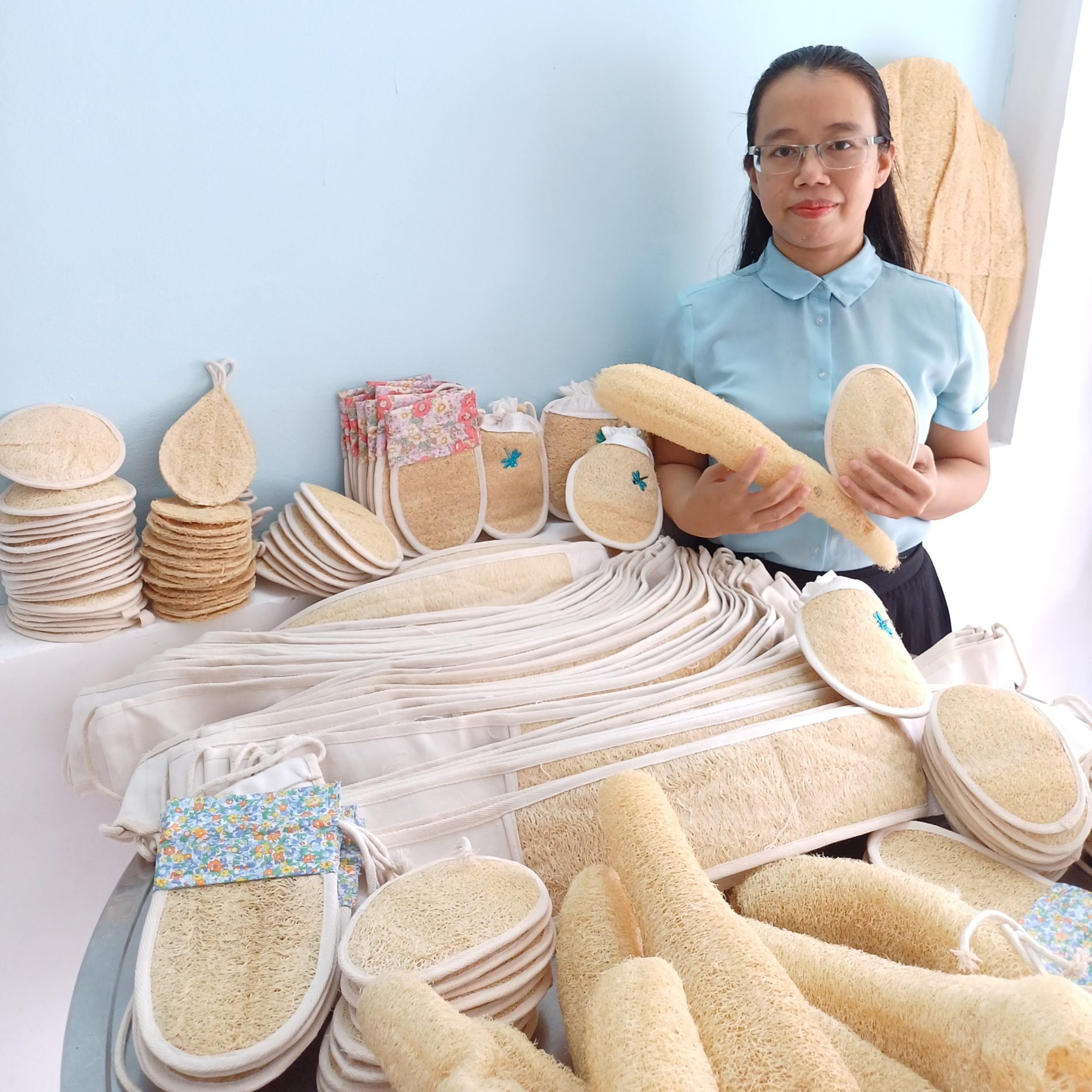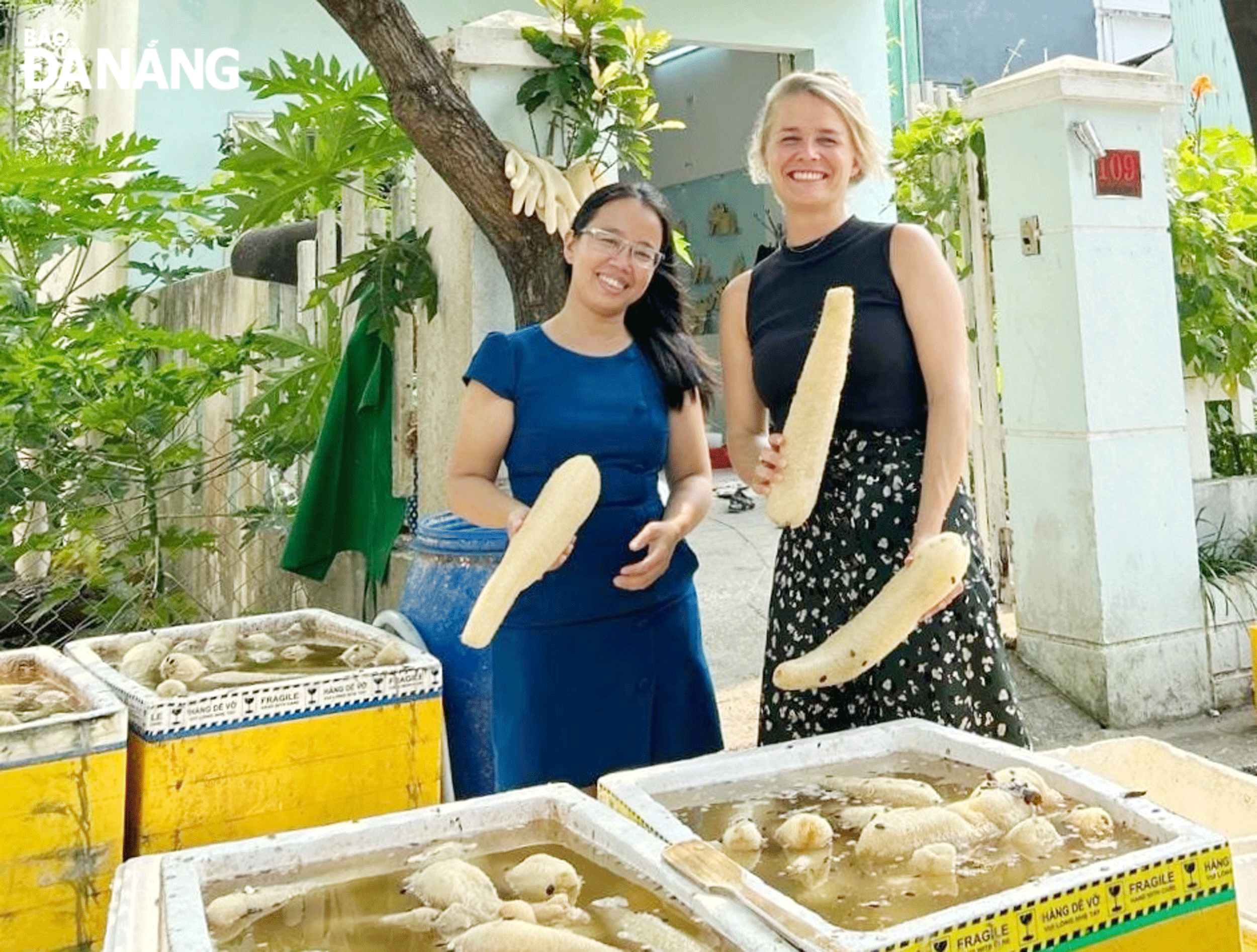Start business from loofah fiber
Being interested in environmentally- friendly items, Ms. Vo Thi Ngoc Thu, 40, decided to start a business with products made from loofah fiber. After nearly two years of starting her career, her loofah fiber products have been exported to the United States, Canada, Australia and some European countries.
 |
| Ms. Vo Thi Ngoc Thu starts her business with products made from loofah fibers. Photo: M.Q |
In early June, the Loofah Moc Xo won the first prize at the ‘Innovative women’s startup ideas in 2024’ competition organised by Thanh Khe District Women’s Union. This also marked the first time that Ms. Vo Thi Ngoc Thu, Director of Vu Nguyen Development Investment Company Limited, had brought her product to compete at the startup competition.
Ms. Thu said that before falling in love with trading loofah products, she was a lecturer at a junior college in the city. Aware of the need to popularise environmentally friendly items and that there are still no facilities processing products from loofah in Da Nang, Ms. Thu decided to start a business in 2022.
Accordingly, loofah fiber is tough, dries quickly, does not smell, is soft, and rarely scratches the skin, so it is very suitable for making items such as slippers, bags, dishwashing pads, bath sponges. Thu realises this is the potential for mass production and business.
At first, Ms. Thu cooperated with farmers in Duy Xuyen District, Quang Nam Province to grow about 0.5 hectares of luffa. With experience in science and technology, Ms. Thu learned how to grow luffa varieties with lots of fiber and large fruits.
With luffa used for eating, it only takes 1-1.5 months from sowing seeds to harvest. However, luffa for fiber needs about 3 months for the luffa to almost dry its skin (about 80% dry) before harvesting. Each harvest yields 500 - 700 fruits/acre (0.05ha). From the initial 0.5 hectares,
Ms. Thu has now expanded the production area in Duy Xuyen District to 3 hectares and 1.5 hectares in Gia Lai and Dak Lak provinces to meet production needs. On average, each month the production areas provide raw materials about 3,000-4,000 sponge gourds for the factory to process.
So as to ensure product quality, Ms. Thu recommends that households growing luffa for fiber firmly reinforce the trellis to prevent it from collapsing. When harvesting, they must follow the correct procedure to ensure the whiteness and thickness of the fiber. After harvesting, loofah is pre-processed, cleaned, dried and then brought to the factory to carry out the processes of rolling, cutting, sewing, shaping and packaging.
After an initial period of searching for the market, Moc Xo Loofah products have so far appeared in a number of souvenir shops across Viet Nam and exported to the United States, Canada, Australia and some European countries with a large quantity. Product output is about 10,000 pieces/month.
Currently, Ms. Thu’s manufacturing establishment creates stable jobs for 6 workers with an income of VND 6 million /month, 3 seasonal workers with an income of VND 3-5 million/month and 10 farmer households in growing areas.
 |
| Ms. Vo Thi Ngoc Thu started her business with products made from loofah. Photo: M.Q |
When it comes to her plans, Ms. Thu will continue to invest in expanding production. In the immediate future, she will invest in more pressing, cutting, sewing and embroidery machines to speed up production pace.
Although exports are favourable, Ms. Thu is determined to promote the domestic market through fairs as well as access to the ‘One Commune - One Product’ Programme (OCOP), expanding production areas in Hoa Bac Commune, Hoa Vang District to create new jobs for local people.
“Besides targeting profits, I want my project to be known by many people, using loofah fibers to contribute to promoting the consumption of environmentally-friendly products, thereby making the environment greener," Ms. Thu said.
Assessing the potential of the Moc X loofah project, Mr. Le Duc Vien, the Director of the Da Nang Department of Science and Technology, said that developing environmentally-friendly products is extremely important.
In the coming time, the Da Nang Department of Science and Technology will continue to accompany and support the project in the next stages with the aim of facilitating the construction and development of raw material areas for the project, guide the project in implementing procedures to receive financial support from the city’s startup policies, offer training for this startup business, orient the development of plans for research on production technology and enterprise development, and provide support for intellectual property and trademark registration.
Reporting by MAI QUE - Translating by A.THU